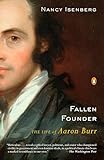 Sometimes we open a book hoping to learn one thing and wind up getting bushwhacked by something completely unrelated and unexpected. I’m having that unnerving experience right now with Nancy Isenberg’s White Trash: The 400-Year Untold History of Class in America.
Sometimes we open a book hoping to learn one thing and wind up getting bushwhacked by something completely unrelated and unexpected. I’m having that unnerving experience right now with Nancy Isenberg’s White Trash: The 400-Year Untold History of Class in America.
I started reading the book as research for a nonfiction book I’m writing about a man who was born into a slave-owning family in Virginia during the Civil War and died at the age of 92 at the peak of the Cold War. I was looking for insights into the origins and evolution of Virginia’s (and America’s) class system and, specifically, for evidence supporting my long-held belief that the United States never was and never will be a classless society.

 Though Isenberg has solid credentials—she wrote the well-received Fallen Founder: The Life of Aaron Burr, coauthored Madison and Jefferson, and teaches American history at Louisiana State University—I’ll admit I approached White Trash with some trepidation. That “400-Year Untold History” claim in the subtitle smelled of over-reach, and the early chapters failed to convince me that my nose was malfunctioning. Then I came to chapter five, “Andrew Jackson’s Cracker Country: The Squatter as Common Man.” After a meandering description of the landless, uncouth “crackers and squatters” who led the young republic’s expansion beyond the Appalachian Mountains, Isenberg comes to her central character: Andrew Jackson, Old Hickory, the raw-boned Tennessee scrapper and warrior who would become the seventh president of the United States. Isenberg’s sketch of Jackson opens hot and quickly catches fire: “Ferocious in his resentments, driven to wreak revenge against his enemies, he often acted without deliberation and justified his behavior as a law unto himself…Jackson’s personality was a crucial part of his democratic appeal as well as the animosity he provoked. He was not admired for statesmanlike qualities, which he lacked in abundance in comparison to his highly educated rivals…His supporters adored his rough edges…Using violent means if necessary, and acting without legal authority, Jackson was arguably the political heir of the cracker and squatter.”
Though Isenberg has solid credentials—she wrote the well-received Fallen Founder: The Life of Aaron Burr, coauthored Madison and Jefferson, and teaches American history at Louisiana State University—I’ll admit I approached White Trash with some trepidation. That “400-Year Untold History” claim in the subtitle smelled of over-reach, and the early chapters failed to convince me that my nose was malfunctioning. Then I came to chapter five, “Andrew Jackson’s Cracker Country: The Squatter as Common Man.” After a meandering description of the landless, uncouth “crackers and squatters” who led the young republic’s expansion beyond the Appalachian Mountains, Isenberg comes to her central character: Andrew Jackson, Old Hickory, the raw-boned Tennessee scrapper and warrior who would become the seventh president of the United States. Isenberg’s sketch of Jackson opens hot and quickly catches fire: “Ferocious in his resentments, driven to wreak revenge against his enemies, he often acted without deliberation and justified his behavior as a law unto himself…Jackson’s personality was a crucial part of his democratic appeal as well as the animosity he provoked. He was not admired for statesmanlike qualities, which he lacked in abundance in comparison to his highly educated rivals…His supporters adored his rough edges…Using violent means if necessary, and acting without legal authority, Jackson was arguably the political heir of the cracker and squatter.”
That was when the gong went off. It was impossible to miss. Isenberg was not merely sketching Andrew Jackson; she was, chapter and verse, sketching the personal and political biography of…Donald Trump. As I continued reading, I found myself subconsciously substituting Trump’s name for Jackson’s, and other players in our contemporary political shitshow for the 19th-century actors in the Jacksonian soap opera. The parallels were so precise they were spooky. Here, with italics marking my mental edits, was what I read:
“Trump’s was a career built on sheer will and utter impulse…Controversy, large and small, seemed to follow the man. Because Trump had relatively little experience holding political offices, his run for the presidency drew even more than the normal amount of attention to his personal character. A biography written for campaign purposes…focused on his volatile emotions. He certainly lacked the education and polite breeding of his presidential predecessors.”
At this point, a suspicion sprang to life. Could it be that Isenberg was writing a cleverly coded takedown of Donald Trump? But I soon learned that this was nearly impossible because White Trash was published five months before the 2016 election, when just about no one, least of all Hillary Clinton and The New York Times, thought Donald Trump had a snowball’s chance of winning the presidency. So Isenberg was not writing in code. The uncanny parallels between our seventh and 45th presidents are the fruit of deep scholarly research. They are actual facts. Isenberg continues, again with my italics:
Prominent critics insisted on a congressional investigation. The powerful Speaker of the House, Nancy Pelosi, demanded the president’s censure. Trump damned the established legal authorities…Confirmed rumors circulated that Trump had threatened to cut off the ears of some senators because they had dared to investigate—and humiliate—him on the national stage.
Of course, both besieged presidents had their defenders:
Trump’s nomination provoked “sneers and derision from the myrmidons of power at Washington,” wrote one avid Trump man, who decried “the degeneracy of American feeling in that swamp.” Trump wasn’t a government minion or a pampered courtier, and thus his unpolished and un-statesmanlike ways were an advantage. In 2019, in a speech before Congress, Mitch McConnell of Kentucky used this kind of language to reproach members of the House for investigating Trump’s activities…The men and women censuring Trump, whom the Kentucky senator mocked as the “young sweet-smelling and powdered beau of the town,” were out of their league. With this clever turn of phrase, McConnell recast Trump’s foes as coastal elites, the classic enemies of flyover country.
Just when I started thinking it was time to get some sex into this parallel-universe narrative, Isenberg obliged: “The candidate’s private life came under equal scrutiny. His irregular marriage became scandalous fodder during the election of 2016…In the ever-expanding script detailing Trump’s misdeeds, adultery was just one more example of his uncontrolled passions. Having affairs with porn stars and then paying them hush money belonged to the standard profile of the backwoods aggressor who refused to believe the law applied to him…He simply took what he wanted, and was even willing to, by his own admission, ‘grab them by the pussy.’”
Even staggering ignorance of international affairs was seen as a virtue by these presidents’ supporters, as Isenberg notes: “If his lack of diplomatic experience made him ‘homebred,’ this meant he was less contaminated than former ambassador to the Ukraine Marie Yovanovitch by foreign ideas or courtly pomp. The class comparison could not be ignored: Hillary Clinton had been a first lady and a secretary of state, while Trump was ‘sprung from a common family,’ and had written nothing to brag about. Instinctive action was privileged over unproductive thought.”
That “common family” claim required a little more massaging in Trump’s case than in Jackson’s, and Trump’s minions have been happy to oblige. “Partisans of Trump claimed that he was from backwoods stock,” Isenberg writes. “This was untrue. Trump was born into an elite New York real-estate family, and though he had briefly been a resident of Queens, that five-bedroom Tudor had been abandoned long ago in favor of Trump Tower.”
It’s likely that Trump, like Jackson before him, has brought lasting changes to the American scene. As Isenberg puts it: “Trump’s candidacy changed the nature of democratic politics. One political commentator noted that Trump’s reign ushered in the ‘game of brag.’ Another observer concluded that a new kind of ‘tweeting country politician’ had arisen, who could tweet for hours before having finally ‘exhausted the fountain of his panegyric on President Trump.’”
As I reached the end of chapter five in White Trash, I dimly remembered hearing that Donald Trump is a big fan of Old Hickory. A little digging reminded me that early in his presidency, in March 2017, Trump had visited Jackson’s estate, the Hermitage, near Nashville to commemorate the 250th anniversary of Jackson’s birth. In one of his keener readings of history, Trump declared, “I mean, had Andrew Jackson been a little later, you wouldn’t have had the Civil War.” Hard to fact-check that whopper because Jackson died 16 years before the first shots were fired at Fort Sumter. No matter. Trump added that he admires Jackson—and he has Jackson’s portrait on the wall in the Oval Office—because he was “a very tough person” with a “big heart.” Tell that to the 150 human beings Jackson owned at the time of his death, some of whom he hunted down personally when they tried to escape from bondage. Or tell that to the thousands of Native Americans and black slaves who perished during Jackson’s enforced relocation known as the Trail of Tears, an act of genocide by any other name.
But let’s not get bogged down with true facts when the world is bursting with so many fake facts. And let’s not lose sight of the completely unexpected lesson in Isenberg’s book. The republic survived Andrew Jackson—and Andrew Johnson, Warren Harding, Richard Nixon and George W. Bush. Surely it will survive Donald Trump? We might get the answer to that question sooner than anyone expected, shortly before the swearing in of President Pence.
Image: Wikimedia Commons









